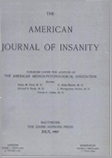Abstract
A case is presented in which the anterior-inferior portions of both frontal lobes were removed in 1934. The present (1939) functional activity of the remaining frontal structures is not definitely known but the nutrition of the tissue seemed not to be grossly impaired at the time of operation. There is no evidence from encephalography of local or general pressure. As nearly as can be determined from the surgeon's maps the ablation involves all of Brodmann's areas 11 and 47, the lower three-quarters of area 10, and the inferior quarters of areas 45 and 46. This patient's present I. Q. is approximately 120. Nevertheless his behavior is far from normal. He lacks initiative and tends to become stereotyped in his routine. A careful psychological study was made using a number of standard and special tests, from which we draw the following conclusions:
1. The Babcock test indicates a loss in his efficiency.
2. Bender's visual-motor gestalt test gave no evidence of deficit.
3. Two of Goldstein's tests, namely, his adaptation of the Kohs-Block test and his adaptation of the Holmgren wool test, uncovered no defect, but the Vigotsky test brought out a rigidity in his categorical attitude and a failure to appreciate the total situation.
4. On the Knox-Cube test his performance approximated the median for children of seven and eight years. On our adaptation of this test, he could reproduce only lines of four taps. Following instruction to group them he reproduced lines of six taps. Interspersing a delay reduced his performance slightly, but not sufficiently to demonstrate that Jacobsen's findings concerning the deficit in temporal integration in monkeys with frontal-lobectomies can be extended to this man.
5. With Hunt's arithmetic progressions and narrative containing absurdities, his performance was similar to that of paretics. He failed with the progressions, but noted most of the absurdities at the first reading.
6. Increased motivation did not improve his performance with the arithmetic progression, but suggestions concerning procedure led to considerable improvement. His failure with more complicated progressions consisted in an inability to keep more than two series of numbers separated.
7. On the Ishihara test of color-vision he failed to see any figures until told to look for them.
8. These performances led the writers to formulate this patient's deficit into four aspects: Failure to supply spontaneously fresh modes of attack on a problem apparently resulting from an inability to abstract that aspect of the situation causing the difficulty, a rigidity of the "categorical attitude," a sharp limitation in the number of lines of endeavor that he can successfully keep separated simultaneously, and inability to integrate several aspects of a situation. We were inclined to regard the deficit a defect of abstract behavior at a relatively high level.
9. The encouraging response of our patient to instruction gives hope of considerable rehabilitation.
10. We wish to emphasize that the frontal lobes cannot be considered as silent areas, and that in psychosurgery it must be remembered that one disease is substituted for another.

